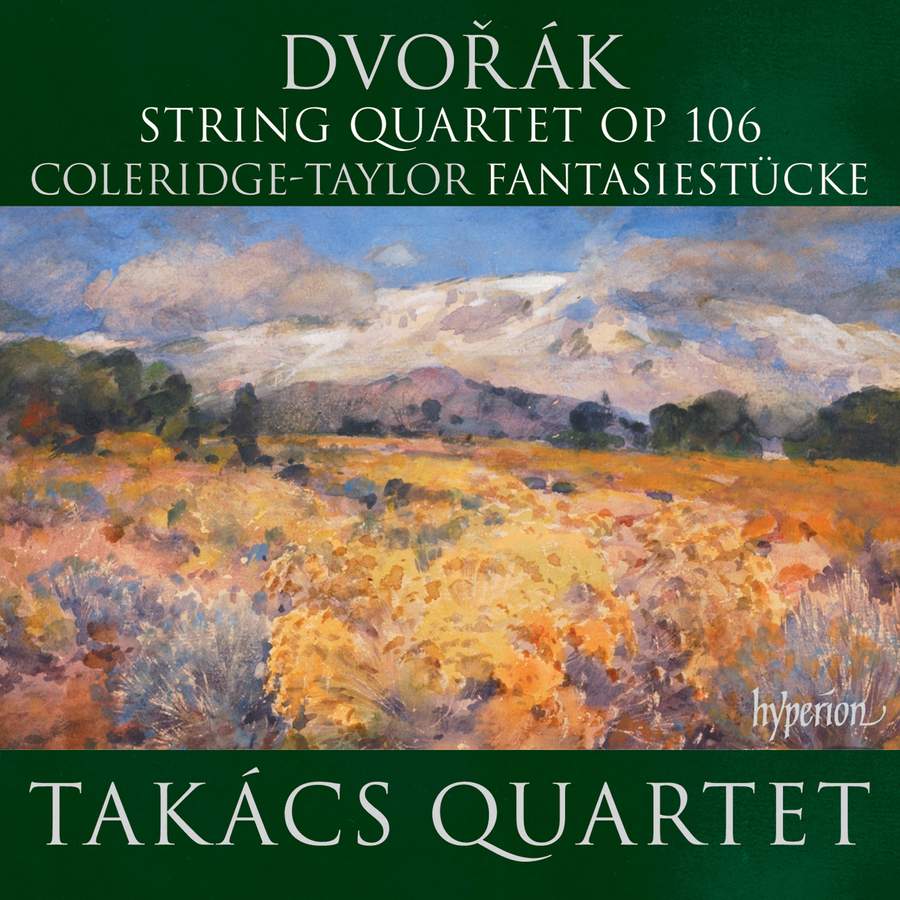COLERIDGE-TAYLOR Fantasiestücke DVOŘÁK String Quartet Op 106
View record and artist detailsRecord and Artist Details
Genre:
Chamber
Label: Hyperion
Magazine Review Date: 09/2023
Media Format: CD or Download
Media Runtime: 64
Mastering:
DDD
Catalogue Number: CDA68413

Tracks:
| Composition | Artist Credit |
|---|---|
| 5 Fantasiestücke for String Quartet |
Samuel Coleridge-Taylor, Composer
Takács Quartet |
| String Quartet No. 13 |
Antonín Dvořák, Composer
Takács Quartet |
| Andante appassionato |
Antonín Dvořák, Composer
Takács Quartet |
Author: Amy Blier-Carruthers
The Takács Quartet’s reputation precedes them. Gramophone Award-winners, resident at London’s Southbank Centre, the University of Colorado Boulder and now the Wigmore Hall, you might think that they could afford to rest on their laurels, but not here! The Takács are impressive on this album: every micro-phrase, every note is considered. Their sound draws you in from the first moment. The opening chords and sinuous lines vibrate and thrill on many levels; this is of course to do with their rich and subtle playing but also the fantastic recorded balance. To simultaneously hear the separate parts and the collective so beautifully is a treat indeed: it feels like being right up there with them – the fifth member of the quartet.
This performance offers a riveting introduction to Coleridge-Taylor’s Five Fantasiestücke for those who don’t know it – a beautiful patchwork of contrasts and vibrant sonorities. With the swooping lines of the upper voices of Edward Dusinberre and Harumi Rhodes, and the deep bass lines plummeting and landing with perfect weight and trajectory, I could listen to the Prelude on repeat with pleasure. The rest of the Fantasiestücke is good, too: the heartfelt, lilting Serenade offers subtle and refined portamentos, for example, but for me the Prelude is the winner, stylistically distinctive and performatively fully committed.
Dvořák’s G minor Quartet also opens with full investment, especially from the growling lower pairing of viola player Richard O’Neill and cellist András Fejér. There is a sense in which the Dvořák is sparklier but more well-known, ground well trodden; as if the Coleridge-Taylor were treated as a new lover and the Dvořák an old love – every curve discovered rather than intimately known. Having said that, the Adagio is heartbreaking. To carry on the metaphor, this is where the drama of the relationship works itself out, the infidelity discovered, the hearts broken, the old love mourned and perhaps repaired. The Takács are all in here – the sound is not just orchestral, it’s psychological. Imagine overdubbing the Rachmaninov in Brief Encounter with this instead. None of them hold back in the devil’s dance of the Molto vivace either.
There is some historical pedigree to consider here, too: the work was premiered in October 1896 in Prague by the Bohemian Quartet, whose second violinist was Josef Suk, Dvořák’s pupil and son-in-law. There are recordings of the Bohemian playing Dvořák, and the earnest, dark and earthy qualities are echoed in those heard here.
I was a bit worried that I might find the Takács too establishment, too polished, but thank goodness, I was quite won over. The refined rawness of the playing and the recorded sound is certainly a beguiling combination. I’ll be booking my ticket for the Wigmore Hall this autumn!
Discover the world's largest classical music catalogue with Presto Music.

Gramophone Digital Club
- Digital Edition
- Digital Archive
- Reviews Database
- Full website access
From £8.75 / month
Subscribe
Gramophone Full Club
- Print Edition
- Digital Edition
- Digital Archive
- Reviews Database
- Full website access
From £11.00 / month
Subscribe
If you are a library, university or other organisation that would be interested in an institutional subscription to Gramophone please click here for further information.




